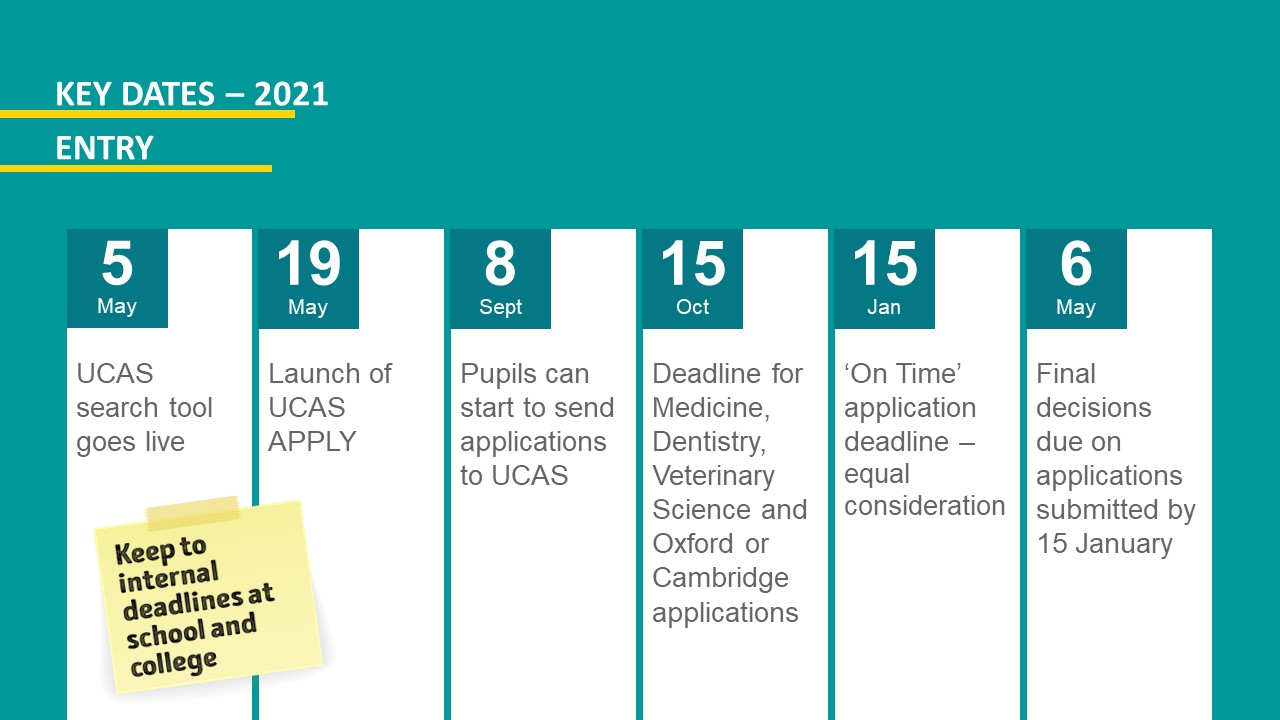
UCAS and the applicant journey
UCAS stands for ‘Universities and Colleges Admissions Service’. It is the organisation that manages application to higher education courses in the UK. In the final year of college/sixth form, students who are applying to study an undergraduate degree at universities or colleges will fill out a UCAS form online where they provide information about themselves, and apply for up to five higher education courses.
Anyone wishing to study in a UK HEI will need to apply via UCAS, and through its website you can search for courses using filters such as the course name, location, style of learning. UCAS provides ‘Apply & Track’ – online tools which make it easier for students, universities and colleges to manage applications and offers. It is also an unbiased guide for students, parents & advisers to help make informed choices about HE and better understand the application process.
The application form process
The application process through UCAS is mostly done online, though you can still get a paper form (however these are reserved for a very small portion of applicants, usually those who can’t gain internet access). Pupils have to fill in most of the sections of the form, but there are some parts that teachers or advisors have to do too. Most pupils will begin exploring their choices and options in Year 12 and start the application process early in Year 13.
Students can apply for up to five courses in one year, and these could all be at the same university or at several different ones (with the exception of the University of Oxford and the University of Cambridge – you can only apply to one of these institutions as a choice on your UCAS form)..
There is a small cost, £20 for one choice or £26 for more than one. If a student decides to only apply for one course, but would like to make additional applications, they can pay the difference (the additional £11) later on. This is common for pupils who are applying for Medicine, Dentistry and other health related courses, or those applying to Oxford or Cambridge, as these courses, and these two institutions have an earlier application deadline than other Higher Education Institutions (HEIs).
The deadline for ‘equal consideration’ – where HEIs will review their whole cohort of applications to decide who to make an offer to – is January 15th every year. This means most pupils won’t hear back about whether they will be made an offer for entry onto a course until after January, and then they will receive their offers/rejections between January and March.
Pupils may find themselves invited to interview or visits days before they are made offers, or asked to submit additional work like art portfolios.
Most young people apply whilst still in Year 13 and so their offers will be ‘conditional’ – based upon them meeting the conditions of their offer, for example achieving AAB at A Level – so by April they will be asked to choose two courses from the offers they have received. One will be their firm choice (their first choice course/HEI), and the other will be their insurance choice (their second choice course/HEI which often has slightly lower entry requirements than their first choice).
As always, there are exceptions. Some HEIs send out offers ahead of the Jan 15th deadline, especially for pupils who have already completed their Level 3 qualification. Specialist colleges have different deadlines that may be linked to portfolio submissions or showcases. As such, pupils need to look very carefully at the application requirements of individual courses to make sure they have given themselves enough time to complete any additional work, or if they need to complete additional course-related work experience before they can be considered for a place on a course.

Additional resources and UCAS
UCAS has some wonderful resources to help young people decide not only if HE is right for them, but also which method and location of study is the most appealing and suitable.
We recommend sharing following UCAS webpages with your pupils
- https://www.ucas.com/further-education
- https://www.ucas.com/undergraduate
- https://www.ucas.com/alternatives-to-university
Outreach at the University of Manchester
Visit the University of Manchester’s Schools and Colleges webpages to find out about other outreach opportunities for and you school
